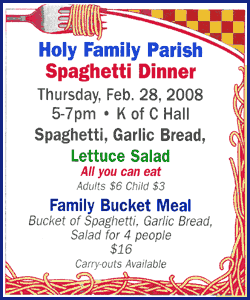|
Seasonal Illness on the Rise
Reports
Indicate Widespread Flu and Colds
 Send a link to a friend
Send a link to a friend
[February 27, 2008]
It happens about this time every
year. It doesn't matter if you are visiting in the grocery store,
the beauty parlor or the coffee shop, you've probably heard someone
telling about the seasonal sicknesses that are going around.
|
|
Regional, state and local reports indicate influenza and upper
respiratory illnesses officially are widespread for the past three
weeks. Reports indicate that the illnesses are not only spreading in
Illinois and surrounding states, but have reached the top
measurement of "widespread" in 48 other states as well.
This year's illnesses have a wide range of symptoms, some rather
severe, which include fevers, blisters in the mouth,
difficult-to-get-rid-of coughs, congestion and extreme fatigue.
Workplaces and schools are seeing more illness-related absences.
Lincoln Community High School nurse Diane Stephenson said that flu
and cold symptoms have increased over the last two weeks.
Abraham Lincoln Memorial Hospital's infectious disease control
nurse, Karen Cluver, said that the hospital is seeing a lot of
people coming in for testing, and a lot of patients are coming into
the hospital through the emergency room. The elderly are the most
affected. There is a lot of influenza type A being found, she said.
While the flu that is going around now was not the one in the
vaccine for this year, some physicians are saying that the vaccine
may have helped more than if you didn't get the shot. Everyone
should still get vaccinated each year, Cluver said.
[to top of second column]
 |

The CDC follows reports of influenzalike illness and acute
respiratory illness -- in other words, flu and cold -- which
commonly peak at the start of March and end about the first week of
May each year. Charts created from lab test results and from reports
by residential institutions and medical facilities indicate that
this year's season is at its peak, and compared with past years,
peaking on the high side.
Some simple actions may protect you and your family from illness
and help reduce the spread of these highly communicable illnesses.
-
Parents should
remind their children to wash their hands frequently and cover
their mouths when they cough or sneeze.
-
You can help
protect our elderly and other immune-compromised individuals by
avoiding contact with them. Postpone your visit while you have
symptoms.
-
Practice good
hygiene, and sneeze or cough into your sleeve.
-
Disinfect commonly touched surfaces:
knobs and handles, phones, keyboards...
[By JAN YOUNGQUIST]
Weekly surveillance chart and interpretations:
http://www.cdc.gov/flu/weekly/index.htm |